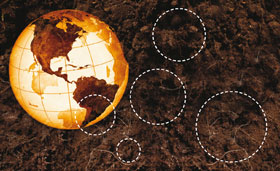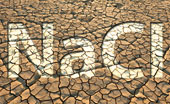

PRODUCING HUMUS
to restore the natural fertility of soils

HUMUS PRODUCTION

CARBON STORAGE

NATURAL FERTILIZATION

WATER-SAVING SOLUTION

REGENERATING "DEAD" SOILS
Marcel Mézy’s process is unique.
It is the only one able to help soils produce humus rapidly and naturally.
Its action lies in the humification of organic matter in all its forms, inducing the development and the quick production of humus. It helps to enhance the clay-humic complex and the fertility of soils. It replaces naturally any basic dressing, organic soil conditioner or added with calcium. It reduces, and in some cases avoids mineral nitrogen input. Through recycling the minerals not absorbed by plants, it increases the level of soil humus, thus restoring all the nutrient elements necessary to the normal growth of plants and crops and to obtain better yields.
Results of experiments performed by Sobac in partnership with scientists and institutions:
"QUICK PRODUCTION OF DEVELOPED ORGANIC MATTER AND HUMIC ACIDS"
Source : Lara Europe Analyses, 75 voie du TOEC, 31 025 TOULOUSE, 1996
(download PDF file - FR)
Functional diagram of a soil without fertilizer (download PDF file - FR)
Functional diagram of a soil with fertilizer (download PDF file - FR)
Functional diagram of a soil with Marcel Mézy’s Process (download PDF file - FR)
(Trademarks Sobac BACTERIOSOL® - BACTERIOLIT®)
Humus is the essential element in the natural fertility of soils
As measured by the INRA (National Institute for Agricultural Research) in France, soil organic matter contents are degrading worldwide, generating a progressive decrease in yields (though compensating with chemical fertilizers) and higher soil erosion.
Humus denotes evolved organic matter that flocculates clay to form the clay-humic complex, real reserve and source of nutrients for the land.
Humus is composed of carbon organic matter, constituting a carbon sink. Its degradation is involved in the CO2 emissions whereas its development combats the greenhouse effect. Moreover, humus constitutes not only a storage of nutrients for plants and soil, but also acts as a sponge that keeps water in summer and lets it flow in winter.
Indeed, by flocculating clay to form granules of the said clay-humic complex, humus structures soil letting necessary water and air flow. Finally, the clay-humic complex develops a cation exchange capacity (CEC) that sequesters electrically the ions of the fertilizing elements that otherwise would have gone to pollute the groundwater.
The quantity of humus enhances the natural fertility of soils.
Its presence proves that the soil is alive and healthy.
Humus is produced by a chain of animals, bacteria, micro-algae and fungi from the soil raw organic matter (straws, dead leaves and roots…) and from soil and air minerals. Humus is different from raw organic matter (straws, dead leaves and roots…) as it is an evolved organic matter. More commonly found in temperate zones, humus is never found in deserts. "When humus goes, mankind goes," as Marcel Mézy likes to say.
![]()

![]() Homepage -
Legal notice -
Contact us
Homepage -
Legal notice -
Contact us
The invention -
Sharing with the worlds farmers -
Marketing -
Humus production -
Carbon Storage -
Natural fertilization -
Water-saving solution -
Regenerating "dead" soils -
Solution for saline soils -
Recycling of organic waste -
Food solutions -
Biodiversity impacts
© Marcel Mézy technologies™ Environmental Solutions - 2012-2013 all rights reserved




